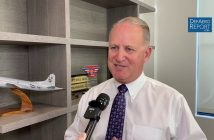Karl Schmidt, a retired US Army lieutenant colonel who is co-head of the aerospace and defense practice at the KippsDeSanto investment bank, discusses the firm’s second annual survey of aerospace, defense and government services merger and acquisition trends with Defense & Aerospace Report Editor Vago Muradian.
Vago Muradian: Welcome to the Defense and Aerospace Report. I’m Vago Muradian here at KippsDeSanto, one of the nation’s leading investment banks in Northern Virginia to talk to Karl Schmidt who is the co-head of the Aerospace and Defense Team here. Karl, great seeing you. You’re a retired military officer, Army officer. West Point graduate. The Army’s been having some great football seasons. I’ll ask you about that a little bit —
Karl Schmidt: Looking good.
Mr. Muradian: It does look good. Let’s first talk about your report. It’s the Second Annual Aerospace Defense and Government Services Report. You guys do business across those fields. You went to 200 dealmakers across the world to sort of get the temperature of the merger and acquisition landscape across all these pieces. Give us a sense of what the key take-aways from your findings have been given that you’re dealing with some of the best and brightest in the field.
Mr. Schmidt: Sure. What we were seeing is obviously very positive momentum going into 2019. We’ve got deal MNA volume up from ’17 to ’18. Obviously you’re well aware of the great deals we’re seeing with ETC, Rockwell; Northrop, Orbital; and obviously more recently Harris, L3; TransDigm, Esterline; et cetera. So all that positive momentum coming from ’17, ’18, pushing into ’19 is really exciting for us.
Valuations. I would say overall the median valuations are probably around 12 times on a trailing basis for the A&D primes. Slightly off 2018, but still ridiculously exciting for overall dealmakers.
And then we’ve got a lot of positive fundamentals going. On the defense side, the ’18 budget was up, the ’19 budget was up. ’20 looks strong. And on the commercial aerospace side, we’re seeing some really strong air traffic fundamentals as well as continued exciting backlog.
So that’s what’s driving this. We had the survey, as you mentioned, the second one. We really wanted to see what folks’ feedback is, what they’re thinking about 2019, what the drivers were.
That feedback that we received, we kind of put into three rough buckets: MNA volume, overall valuations, and then what the buyers’ interest is.
Mr. Muradian: And what do you see as being sort of the big trends that are going to characterize the next year?
Mr. Schmidt: On the MNA deal volume side, the vast majority of our respondents think the drivers are going to be at least flat to slightly economic growth in 2019 from 2018. So that’s kind of the backdrop.
Then about 80 percent of our respondents believe that they’re going to see the same or more deals in 2019. That’s kind of broken a little bit between the corporates and the private equity, but overall folks see a lot more deals this year and they think they’re going to close the same or more deals as they closed last year. So again, all positives.
On the valuation side, look, valuations are strong. It will be hard to compete with 2018. But again, we had a full 80 percent of the respondents thought the overall valuations in the market will be the same or slightly up.
Now again, the corporate dealmakers and the private equity dealmakers see this slightly different, which makes sense because their view is kind of where they sit. On the corporate side, overwhelmingly they think that valuations are going to be the same or slightly up, whereas on the private equity side they think they’re going to be the same or slightly down.
Then lastly, kind of where everybody’s view is of their own interest driving their market participation. We’re seeing on the defense side obviously defense electronics. That’s the driver. Everybody wants to be in C4, C5, ISR. You don’t have a ton of new platforms coming on-line but you have across the board upgrades. So that’s an obvious driver.
On the commercial aerospace side, overwhelmingly the priority seems to be proprietary engineered components and that’s where we’re seeing the most deals.
Mr. Muradian: Are economic jitters playing into this? Because there is this concern that ’19 is going to be an economically down year. We ended ’18 with a little bit of concern. And you talk to the [polls]sort of like look, everything’s going to be fine, especially now that the Fed is not going to be raising interest rates quite as aggressively. But there are still some folks who are like look, this is the longest economic run. Very much of a baseball mentality. The guy’s been a great hitter. They could beat a DiMaggio streak but they probably won’t.
What’s the sense folks are giving you about where they think those economic needles will be that will have implications, whether it’s for defense spending or anyplace else in the government sector?
Mr. Schmidt: Obviously 2018 was exciting. We think a lot of that has pushed into 2019. 2020 is another subject, right? We’ve got the elections coming up. However, interestingly for the mid-term elections, overwhelmingly dealmakers said that had zero impact. What was driving them was either their customer increasing budgets on the commercial side, or increasing in defense.
So all that said, we think ’19s going to continue to be strong. 2020 is another question. We’re not quite looking that far out there. But our firm backlog is at record highs. We’re seeing a record number of deals out there. In fact as we’re in the market right now with a lot of deals the buyers are telling us they need more time, they’ve got their fixed number on their MNA teams, and the number of deals that they’re seeing is extremely tough for them to get through.
It’s unambiguous that 2019 I think is going to be a really strong year. 2020, we’re not quite there yet.
Mr. Muradian: That’s why we’ll tune in to next year’s study which will be as action packed as this was.
A little bit of a discussion on MNA policy. Everybody’s trying to divine where, I mean obviously we’ve seen on the Sprint vote-a-phone deal a little bit of concern. Democratic members have been voicing concerns about that. We always look at, the government always says each deal is taken on its merits but there are also concerns at what point will — and everybody thought Lockheed, Northrop was doable, but that became the deal that couldn’t be done. I don’t think anybody’s raising flags like that on Harris, L3. But from a regulatory, from a market dynamic, from a trend standpoint, we’ve seen a little bit of vertical integration but we’ve also seen devolving companies and breaking them apart as well.
Talk to us a little bit about some of those kind of broader, macro trends we’re seeing. Whether it’s on the vertical integration side or whether it’s on the government sort of regulatory behavior side. Or regulatory mood side of things.
Mr. Schmidt: On the regulatory mood side, I think CFIUS is probably the biggest thing that we’re dealing with. Remember, we’re in the middle market. So we’re not looking at the Harris, L3 deal in the sense that we’re going to be banking that. However, there’s going to be a lot of divestitures coming up out of all these deals. Whether it’s ETC, Rockwell; Harris, L3; certainly TransDigm, Esterline. We’re going to see some divestitures.
However, what we’re seeing on the CFIUS side, and when we’re out in the market and we of course are going to both the strong foreign buyers as well as the U.S. buyers, is that time frame to get a CFIUS deal across the line has extended certainly in the last year. So sellers really have to think twice if the value’s there for them to wait for 60-90 days to get a deal done on the regulatory side.
I think as far as the trends are going, again, I kind of touched on the trends of what people are looking to do and it’s really add scale to specifically customers with products. So there is some portfolio shaping. But we’re also seeing it on the larger side too. We’ve got as many divestitures that we’re working on now that we’ve ever worked on and quite honestly, almost all of those are just simply portfolio shaping, folks that want to get out of a certain markets deemed not core, and then those sorts of assets are very interesting to other strategics, maybe smaller strategics as well as the private equity groups.
Mr. Muradian: Valuation as much as mood. You talked a little bit about where people think valuations are going to go. Everybody’s been very, very, very strong in terms of how everybody’s been valued. Folks have got piles of cash around in order with which to do deals.
Is there an expectation that we’re going to see these kind of valuations continue the way that we’ve been seeing them? Folks have said well, you know, they’ll come down. But these companies are running high. The buy-backs are still continuing. Those haven’t petered out either. Is there an expectation that those trends are going to continue? Everything is driven by perception and demand, right? The valuations will stay high as long as there’s the demand.
Mr. Schmidt: There’s certainly a lot of money out there. The private equity groups have all raised huge funds that they have to put to work. And as you mentioned, the strategics have a lot of cash. But still, what’s driving is need. I think not just trying to get that cash out the door. That said, we do think valuations will be strong. We’re pitching it seems like every other day, we’re in the market with a record number of deals so our feedback that we’re getting from the market is real time. And people do expect strong valuations right now.
It’s hard to say they’re going to be as high as the record highs we had in 2018, but again, I think we’re going to have a really strong 2019 with respect to valuation, and we’ll just have to cross our fingers with respect to 2020.
Mr. Muradian: And speaking about a strong 2019, Army football has been on a run. There was a little bit of a drought there where Navy was dominant for 15 years. Darn near. Are you feeling it again in ’19? I know the big game was just two months ago, and Air Force rides high on all of this saying like yeah, well. But Army had a great season over Air Force as well. So how do you think ‘19s going to look?
Mr. Schmidt: I think we’re going to win again. We’re going to beat Navy.
Look, we had a historic drought, however last year, I hate to use the term again, was historic. We had a ridiculous team. They did fantastic. It’s just great to see the Army — I mean quite honestly, we had Navy guys coming up to me the last few years before we started this mini-win streak actually looking for an Army win, to make things a little bit more fair. I think we’re back. We’re strong. And at least it’s a more interesting competition now.
Mr. Muradian: It’s always good when it goes back and forth because you don’t want, I mean there were Army majors who had not seen Army win, right? That was just awful. And it’s bad for the competition. And occasionally, I’m somebody who enjoys going to the games, you wanted to tell the Navy guys, can you start cheering at some point here? The cadets are doing a really, really great job of being into it and supporting the team. A terrific team.
Karl, absolute pleasure talking to you. Best of luck this year. It’s going to be a very busy year. We look forward to the next year’s study. And may the better team win in December.
Mr. Schmidt: Thank you very much, it was my pleasure.
30




